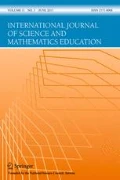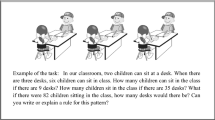Abstract
Teaching in ways responsive to the cultures of our students is vital towards enhancing equity of access to mathematics achievement and putting educational policy into practice. New Zealand has the largest group of Pāsifika people in the Western world, a multi-ethnic group of indigenous people from Pacific Island nations who have differing cultural values and experiences than the dominant Pākehā (Maori term commonly used to refer to European New Zealanders) population. This study aims to explore how patterning tasks based on indigenous patterns can support young diverse students to develop understanding of growing patterns. Two case studies are presented which show the results of an exploratory teaching experiment undertaken with one classroom of culturally diverse Year 2 students (6-year-olds) situated in an urban low socio-economic area. Data drawn for this paper includes video-recorded classroom observations, written responses from students, and reflective notes from the researcher and teacher from two lessons of a series of 10 lessons on growing patterns. Data analysis involved an iterative approach of repeated refinement cycles focusing on early algebraic thinking and the pedagogical actions of the teacher. Findings revealed that the use of indigenous patterns in conjunction with pedagogical actions drawing on cultural values was successful in engaging these students in early algebraic reasoning.



Similar content being viewed by others
References
Abdulrahim, N. A., & Orosco, M. J. (2020). Culturally responsive mathematics teaching: A research synthesis. Urban Review, 52(1), 1–25.
Anthony, G., & Hunter, R. (2017). Grouping practices in New Zealand mathematics classrooms: Where are we at and where should we be? New Zealand Journal of Educational Studies, 52(1), 73–92.
Averill, R. (2012a). Reflecting heritage cultures in mathematics learning: The views of teachers and students. Journal of Urban Mathematics Education, 5(2), 157–181.
Averill, R. (2012b). Caring teaching practices in multiethnic mathematics classrooms: Attending to health and well-being. Mathematics Education Research Journal, 24, 105–128.
Averill, R., & Clark, M. (2012). Respect in teaching and learning mathematics. Set, 3, 50–57.
Bishop, A. (1991). Mathematical enculturation: A cultural perspective on mathematics education. Netherlands: Springer.
Blanton, M., Brizuela, B. M., Gardiner, A. M., Sawrey, K., & Newman-Owens, A. (2015). A learning trajectory in 6-year-olds’ thinking about generalising functional relationships. Journal for Research in Mathematics Education, 46(5), 511–558.
Borck, C. R. (2020). “I belong here”: Culturally sustaining pedagogical praxes from an alternative high school in Brooklyn. Urban Review, 52(2), 376–391.
Carraher, D. W., Martinez, M. V., & Schliemann, A. D. (2008). Early algebra and mathematical generalization. ZDM, 40(1), 3–22.
Carraher, D. W., Schliemann, A. D., Brizuela, B. M., & Earnest, D. (2006). Arithmetic and algebra in early mathematics education. Journal for Research in Mathematics Education, 37(2), 87–115.
Cooper, T. J., & Warren, E. (2011). Years 2 to 6 students’ ability to generalise: Models, representations and theory for teaching and learning. In J. Cai & E. Knuth (Eds.), Early algebraization: A global dialogue from multiple perspectives (pp. 187–214). Berlin, Germany: Springer.
D’Ambrosio, U. (1985). Ethnomathematics and its place in the history and pedagogy of mathematics. For the Learning of Mathematics, 5(1), 44–48.
Enari, D., & Matapo, J. (2020). The digital vā: Pāsifika education innovation during the pandemic. Mai: A New Zealand Journal of Indigenous Scholarship, 9(4), 7–11.
Fujii, T., & Stephens, M. (2001). Fostering an understanding of algebraic generalisation through numerical expressions: The role of the quasi-variables. In H. Chick, K. Stacey, J. Vincent, & J. Vincent (Eds.), Proceedings of the 12th Conference of the International Commission on Mathematics Instruction (pp. 258–264). Melbourne, Australia: University of Melbourne Press.
Funaki, K. (2016). New visions for international aid: Perspectives from the Pacific Islands. Japan Society for Pacific Island Studies, 4, 39–62.
Gay, G. (2010). Culturally responsive teaching: Theory, research, and practice. New York, NY: Teachers College Press.
Gear, A. L. (2012). A cultural introduction to math. Teaching Children Mathematics, 18(6),352–360.
Harel, G., & Tall, D. (1991). The general, the abstract, and the generic in advanced mathematics. For the Learning of Mathematics, 11(1), 38–42.
Hunter, R., & Anthony, G. (2011). Forging mathematical relationships in inquiry-based classrooms with Pasfika students. Journal of Urban Mathematics Education, 4(1), 98–119.
Hunter, R., & Hunter, J. (2018). Opening the space for all students to engage in mathematical practices within collaborative inquiry and argumentation. In R. Hunter, M. Civil, B. Herbel-Eisenmann, N. Planas, & D. Wagner (Eds.), Mathematical discourse that breaks barriers and creates space for marginalized learners (pp. 1–21). Rotterdam: Sense Publishers.
Kaput, J. (1999). Teaching and learning a new algebra. In E. Fennema & T. Romberg (Eds.), Mathematics classrooms that promote understanding (pp. 133–155). Mahwah, NJ: Erlbaum.
Kazemi, E., Franke, M., & Lampert, M. (2009). Developing pedagogies in teacher education to support novice teachers’ ability to enact ambitious instruction. In R. Hunter, B. Bicknell, & T. Burgess (Eds.), Crossing divides: Proceedings of the 32nd annual conference of the mathematics education research Group of Australasia (Vol. 1, pp. 11–30). Palmerston North, NZ: MERGA.
Lannin, J. (2005). Generalization and justification: The challenge of introducing algebraic reasoning through patterning activities. Mathematical Thinking and Learning, 7(3), 231–258.
Lesh, R., & Lehrer, R. (2000). Iterative refinement cycles for videotape analyses of conceptual change. In R. Lesh & A. Kelly (Eds.), Research design in mathematics and science education (pp. 665–708). Hillsdale, NJ: Erlbaum.
Meaney, T., & Evans, D. (2013). What is the responsibility of mathematics education to the indigenous students that it serves? Educational Studies in Mathematics, 82(3), 481–496.
Middleton, M., Dupuis, J., & Tang, J. (2013). Classrooms and culture: The role of context in shaping motivation and identity for science learning in indigenous adolescents. International Journal of Science and Mathematics Education, 11, 111–141.
Miller, J. (2016). Young Indigenous students en route to generalising growing patterns. In B, White., M., Chinnappan., & S., Trenholm (Eds.), Proceedings of the 39th MERGA conference (pp. 469-476). Adelaide, South Australia: MERGA.
Miller, J. & Hunter, J. (2017). Young diverse students in New Zealand and their initial understandings of growing patterns. In B. Kaur, K. Ho, T. L. Toh, & B. H. Choy (Eds.), Proceedings of the 41st annual conference on the International Group for the Psychology of Mathematics Education. Singapore: PME.
Miller, J., Warren, E., & Armour, D. (2018). Mathematical discourse when engaging in pattern generalization. In R. Hunter, M. Civil, B. Herbel-Eisenmann, N. Planas, & D. Wagner (Eds.), Mathematical discourse that breaks barriers and creates space for marginalized learners (pp. 213–234). Rotterdam: Sense Publishers.
Ministry of Education. (2007). The New Zealand curriculum. Wellington: Learning Media.
Ministry of Education. (2017). Mathematics achievement: What we know from New Zealand’s participation in TIMMS 2014/2015 and PISA 2015. Wellington: Ministry of Education.
Ministry of Education. (2018). Tapasā. Wellington: Ministry of Education.
Mogari, D. (2017). Using culturally relevant teaching in a co-educational mathematics class of a patriarchial community. Educational Studies in Mathematics, 94, 293–307.
Moss, J., & Beatty, R. (2010). Knowledge building and mathematics: Shifting the responsibility for knowledge advancement and engagement. Canadian Journal of Learning and Technology, 36, 1–33.
Nakawa, N. (2019). Mathematical values through personal and social values: A number activity in a Japanese kindergarten. In P. Clarkson, W. Seah, & J. Pang (Eds.), Values and valuing in mathematics education (pp. 157–169). Cham: Springer.
Nieto, S. (2010). Culture and learning. In S. Nieto (Ed.), Language, culture and teaching: Critical perspectives (2nd ed., pp. 135-259). New York, NY: Routledge.
Nicol, C., Q’um Q’um Xiiem, J., & Yovanovich, J. (2019). Being guided by Kugann Jaad Mouse woman for culturally responsive mathematics education. In C. Nicol, J. A. Q’um Q’um Xiiem, F. Glanfield, & A. J. S. Dawson (Eds.), Living culturally responsive mathematics education with/in indigenous communities (pp. 17-45). The Netherlands: Brill Sense
Presmeg, N. (2007). The role of culture in teaching and learning mathematics. In F. K. Lester (Ed.), Second handbook of research on mathematics teaching and learning (pp. 435–458). Greenwich, CT: Information Age Publishing.
Radford, L. (2010). Layers of generality and types of generalization in pattern activities. PNA, 4(2), 37–62.
Steffe, L. P., & Thompson, P. W. (2000). Teaching experiment methodology: Underlying principles and essential elements. In R. Lesh & A. E. Kelly (Eds.), Research design in mathematics and science education (pp. 267–307). Hillsdale, NJ: Lawrence Erlbaum Associates.
Turner, H., Rubie-Davies, C. M., & Webber, M. (2015). Teacher expectations, ethnicity and the achievement gap. New Zealand Journal of Educational Studies, 50(1), 55–69.
University of Otago & NZCER. (2014). National Monitoring Study of student achievement, mathematics and statistics 2013. Wellington: Ministry of Education.
Warren, E., & Cooper, T. (2008). Generalising the pattern rule for visual growth patterns: Actions that support 8 year olds’ thinking. Educational Studies in Mathematics, 67(2), 171–185.
Young-Loveridge, J., Taylor, M., & Hawera, N. (2005). Students’ views about communicating mathematically with their peers and teachers. In H. L. Chick & J.L. Vincent (Eds.), PME29: Proceedings of the Annual Conference of the International Group of Psychology of Mathematics Education (vol. 1, pp. 298). Melbourne, Australia: University of Melbourne.
Author information
Authors and Affiliations
Corresponding author
Rights and permissions
About this article
Cite this article
Hunter, J., Miller, J. Using a Culturally Responsive Approach to Develop Early Algebraic Reasoning with Young Diverse Learners. Int J of Sci and Math Educ 20, 111–131 (2022). https://doi.org/10.1007/s10763-020-10135-0
Received:
Accepted:
Published:
Issue Date:
DOI: https://doi.org/10.1007/s10763-020-10135-0




